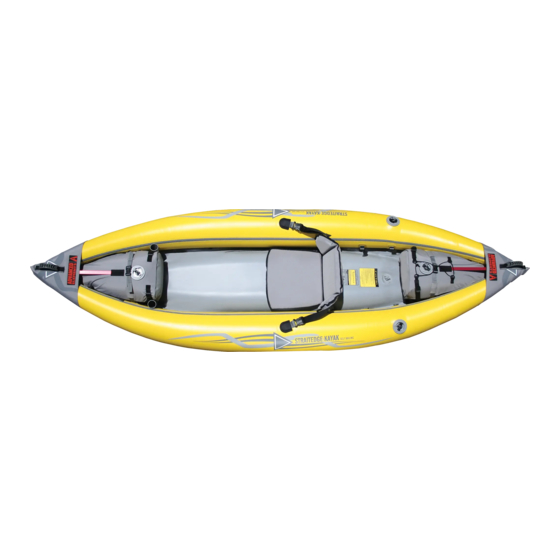Advanced Elements STRAITEDGE AE1006 Owner's Manual del usuario - Página 14
Navegue en línea o descargue pdf Manual del usuario para Barco Advanced Elements STRAITEDGE AE1006 Owner's. Advanced Elements STRAITEDGE AE1006 Owner's 20 páginas. Inflatable kayak
También para Advanced Elements STRAITEDGE AE1006 Owner's: Manual del usuario (12 páginas)

7. TROUBLESHOOTING
PROBLEM
Does not hold air
while inflating.
The kayak is sagging
or under inflated.
The kayak will not hold
full pressure for more
than a couple of hours.
Kayak still loses air.
The floor bladders are
losing air.
Tube is kinked or bent.
The kayak is not self
bailing.
There is water in the
kayak.
The kayak drifts to
one side.
The kayak does not
track well.
14
SOLUTION
The spring valve uses a plunger system. The only time the plunger
should be in the open position is when you are deflating. Make sure
that the plunger is closed to inflate. Push the plunger in and rotate
counter-clockwise.
Be sure that the right pump is being used. You need a bellows foot
pump or a double action hand pump. A 12-V electric does not supply
enough pressure to fully inflate the kayak. The 12-V can be used to par-
tially inflate the kayak but one of the other pumps is needed to top it off.
Make sure that the plunger is in the closed position. It should only
be open when deflating. If it is open, the only seal is the black rubber
gasket inside the cap. Even then, a little air may still leak out.
If you have checked all the previous possible reasons for the kayak los-
ing air, then there may be a pinhole or hole somewhere on the tube. Pull
tube from outer covers. Inflate. If you cannot see or hear where a leak
may be, take a clean rag with soapy water and begin rubbing the tube.
If a hole is present, bubbles will continually form. Repair using repair
kit. If it is a very small pinhole, a dab of the glue may be sufficient.
Check valve gaskets and make sure that the cap thether (ring that holds
the cap to the valve so as not to lose it) is not interfering with the seal.
The valves must be closed tightly.
The tube just needs to be adjusted. When kayak is fully deflated try
adjusting the position of the tube inside of the outer shell.
The kayak is a self bailing kayak. There are four port holes under each
side of the kayak. The port holes have caps so it can be used as a self
bailing or a dry kayak. Make sure the caps are off.
There will almost always be a little water in the kayak. One reason is
the water drips off of the paddle and into the kayak. The kayak is a self
bailing kayak. There are four port holes under each side of the kayak.
The port holes have caps so it can be used as a self bailing or a dry
kayak. Make sure the caps are on.
A kayak will always head in the direction of your last stroke. Make
sure to check that the air bags in the bow and stern are properly inflated
and that the straps are pulled tight. If one of the floor bladders is not
completely inflated, this will also cause the kayak to drift.
Try moving your seat forward a little more. This will allow for better
weight distribution and better tracking.
